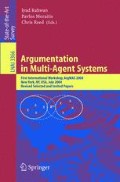Abstract
We present the syntax and semantics for a multi-agent dialogue game protocol which permits argument over proposals for action. The protocol, called the PARMA Protocol, embodies an earlier theory by the authors of persuasion over action which enables participants to rationally propose, attack, and defend, an action or course of actions (or inaction). We present an outline of both an axiomatic and a denotational semantics, and discuss an implementation of the protocol for two human agents.
Access this chapter
Tax calculation will be finalised at checkout
Purchases are for personal use only
Preview
Unable to display preview. Download preview PDF.
References
Atkinson, K., Bench-Capon, T., McBurney, P.: Computational representation of persuasive argument. Technical Report ULCS-04-006, Department of Computer Science, University of Liverpool, UK (2004)
Atkinson, K., Bench-Capon, T., McBurney, P.: Implementation of a dialogue game for persuasion over action. Technical Report ULCS-04-005, Department of Computer Science, University of Liverpool, UK (2004)
Goldblatt, R.: Topoi: The Categorial Analysis of Logic. North-Holland, Amsterdam (1979)
Gordon, T.F.: The Pleadings Game: An exercise in computational dialectics. Artificial Intelligence and Law 2, 239–292 (1994)
Greenwood, K., Bench-Capon, T., McBurney, P.: Towards a computational account of persuasion in law. In: Proc. Ninth Intern. Conf. AI and Law (ICAIL-2003), pp. 22–31. ACM Press, New York (2003)
Habermas, J.: Between Facts and Norms: Contributions to a Discourse Theory of Law and Democracy. MIT Press, Cambridge (1996) (Translation by W. Rehg)
Hamblin, C.L.: Fallacies. Methuen, London, UK (1970)
Hamblin, C.L.: Imperatives. Basil Blackwell, Oxford (1987)
Johnson, R.: Manifest Rationality: A Pragmatic Theory of Argument. Lawrence Erlbaum Associates, Mahwah (2000)
Kamp, H., Reyle, U.: From Discourse to Logic: Introduction to Modeltheoretic Semantics of Natural Language, Formal Logic and Discourse Representation Theory. Kluwer Academic, Dordrecht (1993) (Two Volumes)
Labrou, Y., Finin, T., Peng, Y.: Agent communication languages: The current landscape. IEEE Intelligent Systems 14(2), 45–52 (1999)
Luck, M., McBurney, P., Preist, C.: Agent Technology: Enabling Next Generation Computing. A Roadmap for Agent Based Computing, AgentLink II, Southampton, UK (2003)
McBurney, P., Parsons, S.: Games that agents play: A formal framework for dialogues between autonomous agents. J. Logic, Language and Information 11(3), 315–334 (2002)
McBurney, P., Parsons, S.: A denotational semantics for deliberation dialogues. In: Jennings, N.R., Sierra, C., Sonenberg, E., Tambe, M. (eds.) Proc.Third Intern. Joint Conf. Autonomous Agents and Multi-Agent Systems, AAMAS 2004 (2004)
McCarthy, J., Hayes, P.J.: Some philosophical problems from the standpoint of artificial intelligence. In: Melzer, B., Michie, D. (eds.) Machine Intelligence 4, pp. 463–502. Edinburgh University Press (1969)
Perelman, C., Olbrechts-Tyteca, L.: The New Rhetoric: A Treatise on Argumentation. University of Notre Dame Press, Notre Dame (1969)
Richardson, H.S.: Practical Reasoning about Final Ends. Cambridge University Press, Cambridge (1994)
Salmon, W.C.: Causality and Explanation. Oxford University Press, New York (1998)
Tennent, R.D.: Semantics of Programming Languages. Prentice-Hall, Hemel Hempstead (1991)
Toulmin, S.E.: Knowing and Acting: An Invitation to Philosophy. Macmillan, New York (1976)
Walton, D.N.: The New Dialectic: Conversational Contexts of Argument. University of Toronto Press, Toronto (1998)
Walton, D.N., Krabbe, E.C.W.: Commitment in Dialogue: Basic Concepts of Interpersonal Reasoning. SUNY Press, Albany (1995)
Author information
Authors and Affiliations
Editor information
Editors and Affiliations
Rights and permissions
Copyright information
© 2005 Springer-Verlag Berlin Heidelberg
About this paper
Cite this paper
Atkinson, K., Bench-Capon, T., McBurney, P. (2005). A Dialogue Game Protocol for Multi-agent Argument over Proposals for Action. In: Rahwan, I., Moraïtis, P., Reed, C. (eds) Argumentation in Multi-Agent Systems. ArgMAS 2004. Lecture Notes in Computer Science(), vol 3366. Springer, Berlin, Heidelberg. https://doi.org/10.1007/978-3-540-32261-0_10
Download citation
DOI: https://doi.org/10.1007/978-3-540-32261-0_10
Publisher Name: Springer, Berlin, Heidelberg
Print ISBN: 978-3-540-24526-1
Online ISBN: 978-3-540-32261-0
eBook Packages: Computer ScienceComputer Science (R0)

